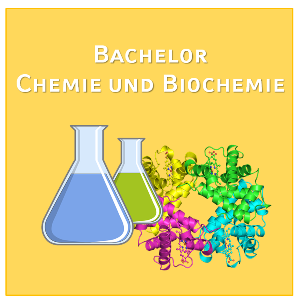General information about the Bachelor thesis
The Bachelor's thesis should be written in one of the two subjects from which the elective modules have been chosen in accordance with Appendix 2 of the examination regulations.
Admission requirements: all achievements of the basic studies (semester 1-4 : 120 ECTS).
The duration of the work is fixed in the examination regulations in §14 at 10 weeks, which corresponds to a total of approx. 400 working hours. For the experimental work, approx. 6 weeks (full time) are planned in the lecture-free period and approx. 8 weeks (slightly more than half time) in the semester, i.e. approx. 240 working hours.
The extent of the written work depends on the topic and the subject, but should be less than the master's thesis, which is equivalent to a diploma thesis.
The student clarifies the topic and the working hours with the working group leader (first examiner). The first examiner must then sign the registration form. This is available in the examination office as soon as the admission requirements are fulfilled.
The registration form for the Bachelor thesis must be submitted to the examination office at the latest when the work begins!
A single copy of the written version of the thesis must be submitted to the Examination Office no later than 4 months after registration.
Two further copies are to be prepared for the first and second examiners respectively.
The paper should be reviewed and graded by the first and second examiners no later than 1 month after submission.
First and second reviewers must be professors of the Departments of Chemistry and Biochemistry.
Informationen zur Bachelor-Arbeit als Download (PDF, 25 KB) (PDF, 25 KB)
Additional regulations for the preparation of external bachelor theses
The Bachelor thesis may be produced at institutions external of the LMU departments of Chemistry or Biochemistry (national as well as abroad).
Therefore you have to submit an informal proposal to the examination office, which will be evaluated by the chair of the examination committee.
The proposal should express the following points:
- Topic of the thesis
- Name of the external supervisor (including information to the institution)
- Signature of the external and official supervisor (=Prüfungsberechtiger) of the departments, who works in this scientific field (requires prior consultation with the official supervisor)
If you plan a thesis in industry, you also have to submit a transcript. Additionally, you have to mention that the external supervisor has to furnish an opinion (including marks), that he/she transfers to the official supervisor of the departments.


